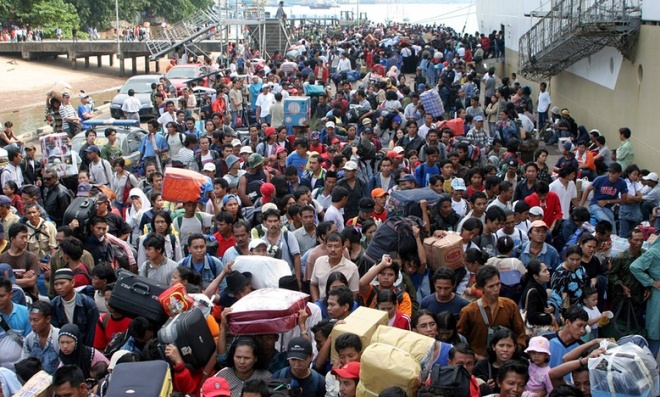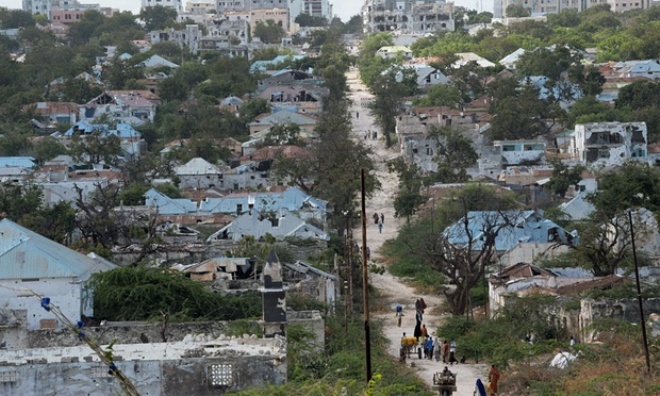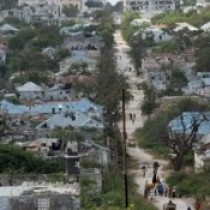
Mogadishu ranked second fastest growing city in the World
Is the planet's fastest growing metropolis in China, Indonesia or Niger? With many different methods of measurement, there's no simple, single answer 

Batam in Indonesia is the fastest-growing city in the world by population according to Demographia. Photograph: Tundra Laksmana/AP
advertisements
The
fastest growing city in the world is Batam in Indonesia … or Niamey in
Niger … or maybe Xiamen in China. It all depends on who you ask.
Batam is the fastest-growing city in the world by population, according to US-based consultancy Demographia, which bases its annual Demographia World Urban Areas ranking largely on the United Nations’ 2010-20 world population forecasts – but only includes cities with a population of 1 million or more. Batam is close to Singapore and operates as a transport hub and industrial area, while a free-trade zone boosts trade with the island city-state. Batam had a population of 1.1 million in the latest estimate, with an annual growth of 7.4%.
Second on Demographia’s ranking is Mogadishu in Somalia, with a population of 2.1 million, growing at 6.9%. Mogadishu’s growth is driven by its improving security situation and economic prospects after decades of civil war – many Somalis have returned from abroad.

Mogadishu’s growth is driven by its improving security situation and economic prospects after decades of civil war
In third place is Ouagadougou in Burkina Faso, with a population of 2.7 million and growth of 6.8%. The country as a whole is vulnerable to fluctuations in commodity prices, but its capital is benefiting from investment in infrastructure.
The fourth and fifth fastest-growing cities in the world are both in China, with Xiamen growing at 6.7% with a population of 4.4 million and Yinchuan growing at 6.1% with a population of 1.6 million. A slowdown in Chinese economic growth could mean that some Chinese cities drop down the leader board of the world’s fastest growing cities, according to Demographia’s Wendell Cox.
But the Chinese government’s attempts both to make the economy less dependent on exports and to ensure the west of the country shares in new prosperity may make for faster growth rates in cities such as Chengdu, he says. With a population of over 10 million, making it a megacity already, Chengdu, in 91st place on Demographia’s list, is still showing 3.5% annual population growth and covers a sprawling 1,541 km sq.
"The government is committed to encouraging more people to move to cities because of the greater prosperity they expect in the long run. So even with the slowdown in the economy, you’re liable to still see growth in Chinese cities,” says Cox.
The 15 cities Oxford Economics estimates are growing the fastest are all in Africa. The consultancy studies 770 cities, meaning much smaller cities are included than in Demographia’s leader board.
Niamey, the capital of Niger in West Africa, is at the top of the list, with Oxford Economics forecasting average annual population growth of 5.2% between 2015 and 2030 from a population of about 1.5 million last year. Next come Abuja in Nigeria at 5% and Lusaka in Zambia at 4.6%. Ouagadougou comes in at number 11, with 4.2% forecast growth.
Tanzania, where natural resources and tourism have fuelled economic growth, has Dodoma, Mwanza and Dar Es Salaam in seventh, eighth and ninth places. Tiny, landlocked Malawi – one of the world’s poorest and least developed economies – accounts for 10th place with its capital Lilongwe.
The biggest city in Oxford Economics’ top 15 is Kinshasa, capital of the Democratic Republic of Congo, at number 13, with a projected growth rate of 4.1% from a population of just over 11 million last year. The consultancy’s forecast of the world’s biggest cities in 2030 looks entirely different, with Tokyo, Shanghai and Beijing taking the top three spots.
Country- or continent-wide higher fertility rates can have an influence on the pace of city growth, Cox says, explaining why North American, European and Australian cities don’t feature in the rankings.
And even if economic growth in some urban areas slows, leading eventually to a knock-on effect of fewer people arriving to seek work, Chinese cities still take many of the top spots in a ranking of the world’s fastest growing cities by New York University’s Stern School of Business, which runs the NYU Stern Urbanisation Project, a thinktank set up to monitor urban growth and advise municipalities in fast-growing cities.
NYU’s Dr Shlomo Angel estimates that Xiamen in China is the world’s fastest growing city in terms of population, with a 7.2% growth rate between 2000 and 2010. Six of the top 10 fastest growing cities in his ranking – which also assesses cities with a population of over 1 million – are in China. The data on Chinese cities comes from the Chinese Academy of Sciences and the rest from the UN Population Division, based on growth rates from 2000-2010.
Cox believes the fastest growth in terms of geographical area is occurring in Chinese cities, too. With the caveat that it can be hard to establish whether digital mapping tools are using current maps or those that are a few years out of date, Cox says: "Guangzhou-Foshan, Tianjin and even Beijing are experiencing significant growth in their urban footprint. We also have to consider the Yangtze river delta – Shanghai continues to grow geographically.”
Changing patterns in working and commuting can drive growth in the geographical area of a city. "Some of my Chinese colleagues say there is a lot of commuting going on between the eastern edge of Suzhou and the Hongqiao airport area which is just to the east of Shanghai,” Cox says.
India, set to overtake China as the world’s most populous country by 2022, is also experiencing fast growth in some of its urban areas, Cox says, technology hubs Bangalore and Hyderabad in particular. "This geographical expansion is really a reaction to population growth,” Cox says. "The new residents of cities are largely poor people. There is significant expansion of geography going on where there continues to be significant population growth,” he adds.
The fastest growth rates in terms of geography occur in places without strict planning regulations, or where they are not enforced, allowing for the construction of informal housing at city limits – and that is not likely to change any time soon.


Batam in Indonesia is the fastest-growing city in the world by population according to Demographia. Photograph: Tundra Laksmana/AP
advertisements
Batam is the fastest-growing city in the world by population, according to US-based consultancy Demographia, which bases its annual Demographia World Urban Areas ranking largely on the United Nations’ 2010-20 world population forecasts – but only includes cities with a population of 1 million or more. Batam is close to Singapore and operates as a transport hub and industrial area, while a free-trade zone boosts trade with the island city-state. Batam had a population of 1.1 million in the latest estimate, with an annual growth of 7.4%.
Second on Demographia’s ranking is Mogadishu in Somalia, with a population of 2.1 million, growing at 6.9%. Mogadishu’s growth is driven by its improving security situation and economic prospects after decades of civil war – many Somalis have returned from abroad.

Mogadishu’s growth is driven by its improving security situation and economic prospects after decades of civil war
In third place is Ouagadougou in Burkina Faso, with a population of 2.7 million and growth of 6.8%. The country as a whole is vulnerable to fluctuations in commodity prices, but its capital is benefiting from investment in infrastructure.
The fourth and fifth fastest-growing cities in the world are both in China, with Xiamen growing at 6.7% with a population of 4.4 million and Yinchuan growing at 6.1% with a population of 1.6 million. A slowdown in Chinese economic growth could mean that some Chinese cities drop down the leader board of the world’s fastest growing cities, according to Demographia’s Wendell Cox.
But the Chinese government’s attempts both to make the economy less dependent on exports and to ensure the west of the country shares in new prosperity may make for faster growth rates in cities such as Chengdu, he says. With a population of over 10 million, making it a megacity already, Chengdu, in 91st place on Demographia’s list, is still showing 3.5% annual population growth and covers a sprawling 1,541 km sq.
"The government is committed to encouraging more people to move to cities because of the greater prosperity they expect in the long run. So even with the slowdown in the economy, you’re liable to still see growth in Chinese cities,” says Cox.
The 15 cities Oxford Economics estimates are growing the fastest are all in Africa. The consultancy studies 770 cities, meaning much smaller cities are included than in Demographia’s leader board.
Niamey, the capital of Niger in West Africa, is at the top of the list, with Oxford Economics forecasting average annual population growth of 5.2% between 2015 and 2030 from a population of about 1.5 million last year. Next come Abuja in Nigeria at 5% and Lusaka in Zambia at 4.6%. Ouagadougou comes in at number 11, with 4.2% forecast growth.
Tanzania, where natural resources and tourism have fuelled economic growth, has Dodoma, Mwanza and Dar Es Salaam in seventh, eighth and ninth places. Tiny, landlocked Malawi – one of the world’s poorest and least developed economies – accounts for 10th place with its capital Lilongwe.
The biggest city in Oxford Economics’ top 15 is Kinshasa, capital of the Democratic Republic of Congo, at number 13, with a projected growth rate of 4.1% from a population of just over 11 million last year. The consultancy’s forecast of the world’s biggest cities in 2030 looks entirely different, with Tokyo, Shanghai and Beijing taking the top three spots.
Country- or continent-wide higher fertility rates can have an influence on the pace of city growth, Cox says, explaining why North American, European and Australian cities don’t feature in the rankings.
And even if economic growth in some urban areas slows, leading eventually to a knock-on effect of fewer people arriving to seek work, Chinese cities still take many of the top spots in a ranking of the world’s fastest growing cities by New York University’s Stern School of Business, which runs the NYU Stern Urbanisation Project, a thinktank set up to monitor urban growth and advise municipalities in fast-growing cities.
NYU’s Dr Shlomo Angel estimates that Xiamen in China is the world’s fastest growing city in terms of population, with a 7.2% growth rate between 2000 and 2010. Six of the top 10 fastest growing cities in his ranking – which also assesses cities with a population of over 1 million – are in China. The data on Chinese cities comes from the Chinese Academy of Sciences and the rest from the UN Population Division, based on growth rates from 2000-2010.
Cox believes the fastest growth in terms of geographical area is occurring in Chinese cities, too. With the caveat that it can be hard to establish whether digital mapping tools are using current maps or those that are a few years out of date, Cox says: "Guangzhou-Foshan, Tianjin and even Beijing are experiencing significant growth in their urban footprint. We also have to consider the Yangtze river delta – Shanghai continues to grow geographically.”
Changing patterns in working and commuting can drive growth in the geographical area of a city. "Some of my Chinese colleagues say there is a lot of commuting going on between the eastern edge of Suzhou and the Hongqiao airport area which is just to the east of Shanghai,” Cox says.
India, set to overtake China as the world’s most populous country by 2022, is also experiencing fast growth in some of its urban areas, Cox says, technology hubs Bangalore and Hyderabad in particular. "This geographical expansion is really a reaction to population growth,” Cox says. "The new residents of cities are largely poor people. There is significant expansion of geography going on where there continues to be significant population growth,” he adds.
The fastest growth rates in terms of geography occur in places without strict planning regulations, or where they are not enforced, allowing for the construction of informal housing at city limits – and that is not likely to change any time soon.



 0
0 














Mogadishu ranked second fastest growing city in the World
Is the planet's fastest growing metropolis in China, Indonesia or Niger? With many different methods of measurement, there's no simple, single answer